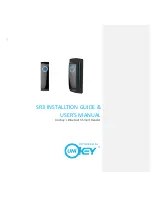
10.3 CLA and CPU Arbitration
Typically, CLA activity is independent of the CPU activity. Under the circumstance where the CLA or CPU
attempt to concurrently access memory or a peripheral register within the same interface, an arbitration
procedure will occur. This section describes this arbitration.
The arbitration follows a fixed arbitration scheme with highest priority first:
They are covered in detail in the Memory Controller Module section of the
System Control and Interrupts
chapter.
10.3.1 CLA Message RAM
Message RAMs consist of blocks:
• CLA to CPU Message RAM
• CPU to CLA Message RAM
These blocks are useful for passing data between the CLA and CPU. No opcode fetches, from either the CLA
or CPU, are allowed from the message RAMs. A write protection violation is not generated if the CLA attempts
to write to the CPU to CLA message RAM, but the write is ignored. The arbitration scheme for the message
RAMs are the same as those for the shared memories, described in the Memory Controller Module section of
the
System Control and Interrupts
chapter.
The message RAMs have the following characteristics:
• CLA to CPU Message RAM:
The following accesses are allowed:
– CPU reads
– CLA data reads and writes
– CPU debug reads and writes
The following accesses are ignored:
– CPU writes
• CPU to CLA Message RAM:
The following accesses are allowed:
– CPU reads and writes
– CLA reads
– CPU debug reads and writes
The following accesses are ignored:
– CLA writes
Control Law Accelerator (CLA)
SPRUH18I – JANUARY 2011 – REVISED JUNE 2022
TMS320x2806x Microcontrollers
575
Copyright © 2022 Texas Instruments Incorporated
Содержание TMS320 2806 Series
Страница 2: ......















































